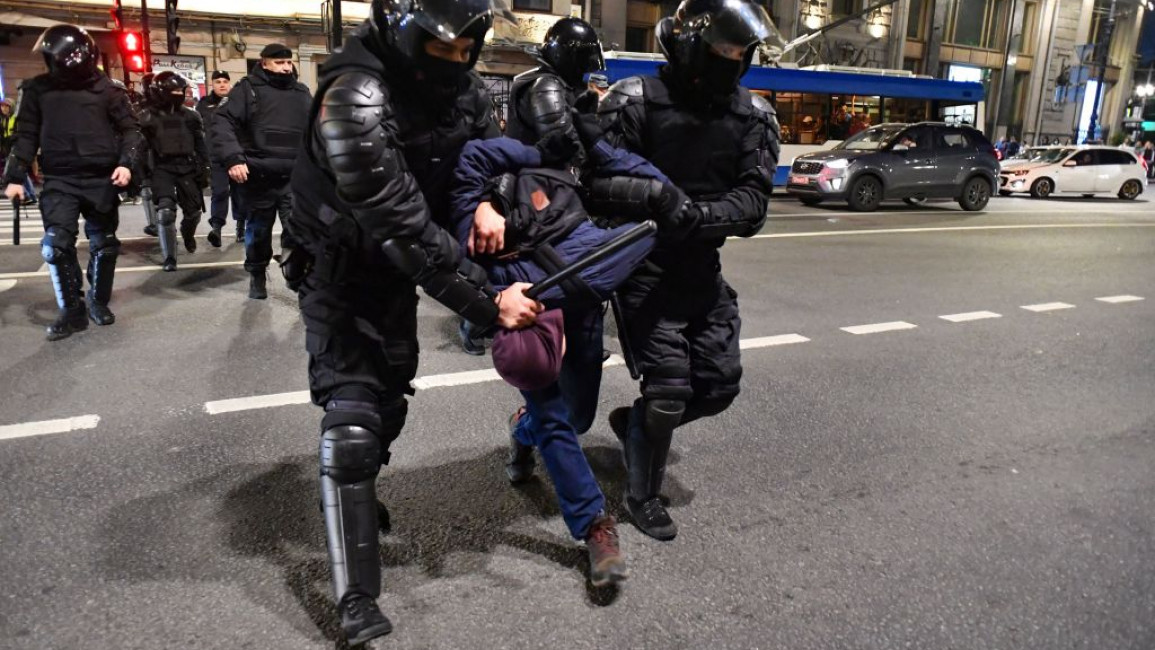Putin's military draft disproportionately affecting Russia's ethnic minorities: reports
Russia’s draft to reinforce its army in Ukraine is disproportionately affecting those living in poor and ethnic minority regions of the vast country, according to rights groups and media outlets.
People living in villages and towns in the Russian Far East, Muslim-majority Dagestan in the Caucasus, or other impoverished or ethnically diverse regions are being called to join the military, sometimes even if they are not on the reserve list and have no experience in battle.
Day 1 of "partial mobilization" in Russia brings mass mobilization of ethnic minorities and the impoverished Far East, and draft notices handed to anyone who protests anywhere else. Great reporting from @Andrew__Roth https://t.co/i968mlWGB4
— Anne Applebaum (@anneapplebaum) September 22, 2022
Hundreds of thousands of young men have been seen leaving the country, trying to flee to neighbouring Georgia or Kazakhstan in an attempt to escape being enlisted.
Members of the Muslim Tatar ethnic group living in Crimea, which until 2014 was a part of Ukraine, are also being called up. According to the Ukraine-based Crimean Tatar Resource Center, all but two out of 48 people who received draft notices in one region were ethnic Tatars.
Russian men continue to flee the draft: the traffic jam at the border crossing to Georgia from Russia is now 15km long, necessitating over 24 hours of waiting. The waiting time to cross to Kazakhstan is 6 hours. Flight tickets are unavailable for almost all destinations. https://t.co/agpeBmd8M5
— Elizabeth Tsurkov🌻 (@Elizrael) September 24, 2022
Throughout history, the Russian military has drafted large numbers of people from Central Asia, the Caucasus and the Far East around the borders with China and Mongolia.
These are often impoverished areas very far from the power centres of Moscow or St. Petersburg, and one reason why they may have been overly affected by the mobilisation order is so Moscow can exert control over them.
"The war [in Ukraine] is one way to control the population, [maintain] control over the local elite, and at the same time is a way to provide a living for families in the poorest areas of the Federation," Ruslan Trad, security researcher at Atlantic Council’s DFRLab and co-author of 'Russian Invisible Armies' told The New Arab.
"The other reason is that in the richer areas of Russia are the 'white' Russians, who are the richest and most important for the government's image. Mobilization was an extreme option because they do not want to engage those who live in the central and western regions."
It is unclear how many people from these wealthier areas have been drafted.
"There are no clear signals at the moment how many people have been mobilized in St. Petersburg and Moscow. For the time, the main mobilization goes in the periphery and from there come the most mobilized," Trad said.
Opposition to Vladimir Putin’s decision for a partial mobilisation calling for reservists to join the army fighting in Ukraine has grown ever since he made the announcement last week.
On Monday, reports emerged that more than 100 people were arrested in Dagestan for protesting against the draft, according to the independent OVD-Info protest monitoring group.
Some of the protestors are being forced to enlist in the army as punishment, according to the rights group.
Dagestan, Russia. Putin’s portraits are being burned by the protesters. Is this a new Russian Revolution? It’s not yet clear, but Kremlin won’t be sleeping tonight for sure. pic.twitter.com/FI3UsLnk09
— Taras Berezovets (@TarasBerezovets) September 25, 2022
«We are not blind! Russia attacked Ukraine. Russia is on foreign soil. No to war!” Dagestan women protest Putin’s criminal mobilization. We thank them for their bravery and urge others to join. Do not let Putin pay for his failed military adventures with lives of your close ones. pic.twitter.com/B1Q63SYbGV
— Ukraine / Україна (@Ukraine) September 25, 2022
Popular anger against Vladimir Putin's decision to mobilize Russia's reserves continues to spiral.
— max seddon (@maxseddon) September 26, 2022
Today in Siberia, a man opened fire at a draft office, severely wounding an official. His mother said he was upset his best friend got drafted. video from @taygainfo pic.twitter.com/lt2xpkWWy3
Dozens of tweets have shown men and women protesting against the draft across the country. Portraits of Putin are reportedly being burned in Dagestan, while a gunman attacked a draft office in Siberia.
Local media reported that a man attempted to set himself on fire at a bus station in the city of Ryazan, about 185 km southeast of Moscow, shouting that he did not want to fight in Ukraine.
Russia’s disastrous invasion of Ukraine that began in February this year has led to the deaths of hundreds of thousands of people and devastated large parts of the country.
Over the past few days, Ukrainian counterattacks have pushed the Russians back, prompting Putin to call his reservists into action.
The war has also exacerbated a global food and energy crisis.



